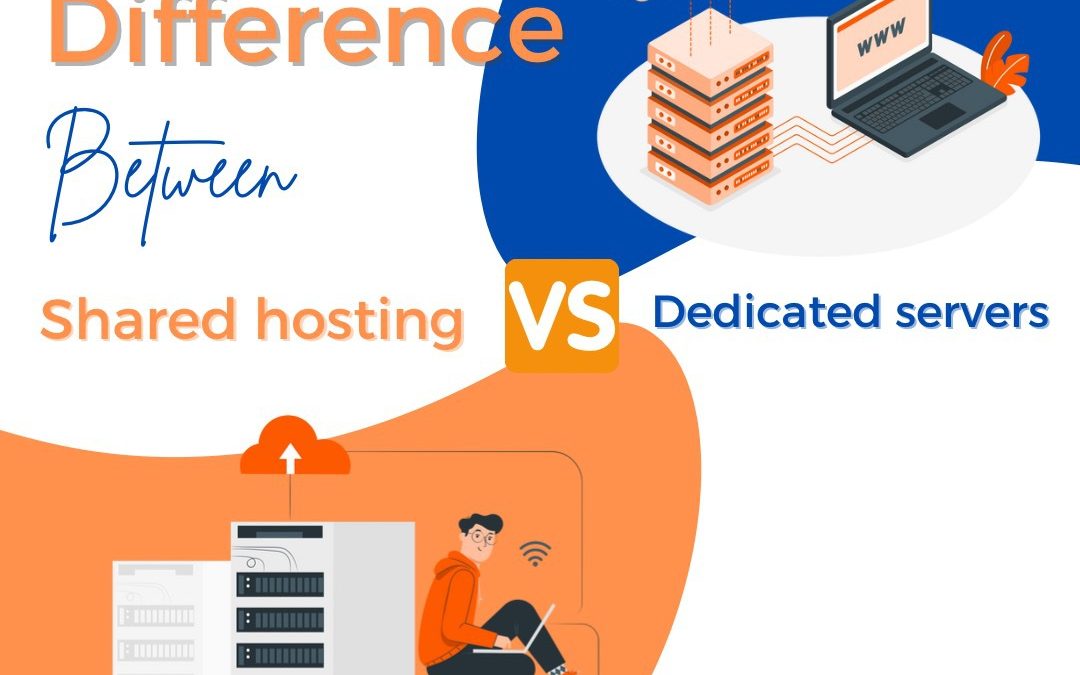
The Power of Website Design
December 30, 2023
E-commerce Consultation
February 2, 2024Introduction
When it comes to establishing an online presence, choosing the right type of hosting is crucial for the success of your website. Two popular options that businesses often consider are shared hosting and dedicated servers. While both options have their advantages, it’s important to understand the differences between the two and how they can impact your digital marketing agency. In this comprehensive guide, we will delve into the details of shared hosting and dedicated servers, helping you make an informed decision for your hosting needs.
Understanding shared hosting
Shared hosting is a popular hosting option for individuals and small businesses looking for an affordable and easy-to-use solution. With shared hosting, multiple websites share resources on a single server, which helps bring down the cost for each user. This makes it a cost-effective option for those with limited budgets.
However, there are some limitations to shared hosting. Since resources are shared, the performance of your website can be affected by other websites on the same server. If one website experiences a sudden surge in traffic, it could lead to slower loading times for all the websites on that server. It is also worth noting that you have limited control over server settings and configurations.
Shared hosting is a great choice for websites with low to moderate traffic and basic hosting needs. If your website is resource-intensive or requires a higher level of security, it might be worth considering a dedicated server. In the next section, we will explore the benefits and drawbacks of dedicated servers in more detail.
Advantages and disadvantages of shared hosting
While shared hosting is a cost-effective option, it does come with its advantages and disadvantages. One of the key advantages is the affordability factor, making it a popular choice for individuals and small businesses with limited budgets. The maintenance and management of the server are taken care of by the hosting provider, allowing users to focus on other aspects of their website.
However, shared hosting does have its limitations. Since resources are shared among multiple websites on the same server, the performance can be affected. If one website experiences a sudden surge in traffic, it could lead to slower loading times for all the websites on that server. Additionally, the level of control over server settings and configurations is limited, which may not be ideal for websites requiring specific customizations.
Overall, shared hosting is a suitable option for websites with low to moderate traffic and basic hosting needs. However, if your website is resource-intensive or requires a higher level of security, it might be worth considering a dedicated server. In the next section, we will delve into the benefits and drawbacks of dedicated servers in more detail.
Exploring dedicated servers
Dedicated servers offer a level of control and customization that shared hosting cannot match. With a dedicated server, you have exclusive access to all the resources, ensuring optimal performance even during high traffic periods. This is particularly beneficial for websites that require extensive processing power, such as e-commerce sites or streaming platforms.
Moreover, dedicated servers provide enhanced security features. Since you are the sole tenant of the server, you have complete control over the security settings and can implement stringent measures to protect your data. This is crucial for websites that handle sensitive information and need to comply with strict privacy regulations.
However, the main drawback of dedicated servers is the cost. They are significantly more expensive than shared hosting plans, making them more suitable for established businesses or websites with high traffic volumes. Additionally, managing and maintaining a dedicated server requires technical expertise, as it involves handling server configurations and updates.
In conclusion, dedicated servers offer unmatched control, customization, and security for websites with specific requirements. If your website is experiencing rapid growth or demands high levels of performance and security, investing in a dedicated server might be the right choice. In the next section, we will explore how to choose between shared hosting and dedicated servers based on your website’s needs and goals.
Benefits and drawbacks of dedicated servers
Benefits and drawbacks of dedicated servers
Dedicated servers come with a host of benefits that make them an attractive option for certain websites. The exclusive access to resources ensures excellent performance, even during peak times of high traffic. For websites that require extensive processing power, such as e-commerce sites or streaming platforms, dedicated servers provide the necessary capabilities to handle heavy workloads efficiently.
Furthermore, the enhanced security features of dedicated servers give website owners peace of mind. Being the sole tenant of the server allows for complete control over security settings, enabling the implementation of stringent measures to protect sensitive data. This feature is particularly valuable for websites that handle customer information and must comply with strict privacy regulations.
However, it’s important to consider the drawbacks of dedicated servers as well. The high cost of dedicated servers may not be feasible for small businesses or websites with limited budgets. Additionally, managing and maintaining a dedicated server requires technical expertise, including handling server configurations and updates. This can be a challenge for those without the necessary knowledge or resources.
In the following section, we will discuss key factors to consider when choosing between shared hosting and dedicated servers, helping you make an informed decision based on your website’s specific needs and goals.
Key factors to consider when choosing between shared hosting and dedicated servers
Now that we have explored the benefits and drawbacks of dedicated servers, it is essential to weigh them against shared hosting to determine which option is best suited for your website.
- Budget: Consider your financial capabilities. Shared hosting is typically more affordable, making it an attractive choice for small businesses or websites with limited budgets. Alternatively, dedicated servers come with higher costs due to exclusive access to resources and enhanced performance.
- Traffic and Workloads: Evaluate the expected traffic and workloads your website will handle. If your website experiences consistent high traffic or requires extensive processing power, such as an e-commerce site or a streaming platform, a dedicated server is advisable. On the other hand, if your website has low to moderate traffic, shared hosting can handle the workload efficiently.
- Security: Assess the level of security your website requires. Dedicated servers offer enhanced security features, allowing for complete control over security settings. This is especially critical for websites that handle customer information and need to comply with privacy regulations. Shared hosting, while generally secure, may not provide the same level of privacy and control.
- Technical Expertise: Consider your technical capabilities and resources. Managing and maintaining a dedicated server requires technical knowledge, including configurations, updates, and troubleshooting. If you lack the necessary expertise, shared hosting may be a more suitable option, as it usually comes with managed services and technical support.
By considering these key factors in your decision-making process, you can tailor your choice between shared hosting and dedicated servers to meet your website’s specific needs and goals. In the next section, we will delve into the various features and considerations of shared hosting, providing a comprehensive perspective for your decision-making process.
Making an informed decision for your business
Now that we have explored the benefits and drawbacks of both shared hosting and dedicated servers, it is crucial to make an informed decision based on your specific business needs. The choice between shared hosting and dedicated servers will have a significant impact on your website’s performance, security, and overall success.
To do this, you need to carefully weigh the factors we discussed in the previous section, including your budget, expected traffic and workloads, required security level, and technical expertise. By considering these key factors, you can narrow down your options and make a choice that aligns with your business goals.
It is important to note that each website has unique requirements, so what works for one may not work for another. Take the time to thoroughly analyze your needs, consult with professionals if necessary, and explore the hosting options available to you.
In the next section, we will delve into the features and considerations of shared hosting, providing you with a comprehensive understanding that will ultimately help you make an informed decision that best serves your business.
Conclusion
As we conclude our comprehensive guide on the difference between shared hosting and dedicated servers, you should now have a better understanding of the factors to consider when choosing the right hosting option for your business. By carefully evaluating your budget, expected traffic, security requirements, and technical expertise, you can make an informed decision that aligns with your specific needs.
While shared hosting offers affordability and ease of use, it may not provide the level of performance and security that dedicated servers offer. On the other hand, dedicated servers offer increased control, scalability, and security, but come at a higher price point.
Remember, every website is unique, and what works for one may not work for another. So, take the time to analyze your needs, consult with professionals if necessary, and explore the hosting options available to you. With the right hosting solution, you can ensure the success and optimal performance of your website. Stay tuned as we delve deeper into the features and considerations of shared hosting in the next section.



